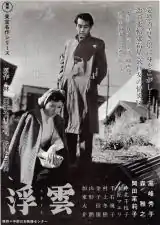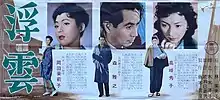Floating Clouds
Floating Clouds (浮雲, Ukigumo) is a 1955 Japanese drama film directed by Mikio Naruse. It is based on a novel with the same name by Japanese author and poet Fumiko Hayashi, written just before she died in 1951. The novel is set after World War II and contains the common post-war theme of wandering; the female main character struggles to find where she belongs in post-war Japan, and ends up floating endlessly about.
| Floating Clouds | |
|---|---|
 Japanese film poster | |
| Directed by | Mikio Naruse |
| Produced by | Sanezumi Fujimoto |
| Screenplay by | Yōko Mizuki |
| Based on | Floating Clouds (novel) by Fumiko Hayashi |
| Starring | Hideko Takamine Masayuki Mori Mariko Okada |
| Music by | Ichirō Saitō |
| Cinematography | Masao Tamai |
| Edited by | Eiji Ōi |
Production company | |
Release date |
|
Running time | 123 minutes |
| Country | Japan |
| Language | Japanese |

The film is Naruse's most popular film in Japan.[1] It was voted the second best Japanese film of all time in a poll of 140 Japanese critics and filmmakers conducted by the magazine Kinema Junpo in 1999.[2]
Plot
The film follows Yukiko Koda, a woman who has just returned to Japan from French Indochina, where she has been working as a secretary. Yukiko seeks out Kengo, with whom she had an affair in Da Lat during the war. They renew their affair, but Kengo tells Yukiko he is unable to leave his wife. Brightly lit flashbacks of their time in Indochina contrast with the sombre tones of the film's present.
Cast
- Hideko Takamine as Yukiko Koda
- Masayuki Mori as Kengo Tomioka
- Mariko Okada as Sei Mukai
- Chieko Nakakita as Kuniko Tomioka
- Daisuke Katō as Seikichi Mukai
- Isao Yamagata as Sugio Iba
- Mayuri Mokusho as Nomiya no musume
- Noriko Sengoku as a lady of Yakushima
- Fuyuki Murakami as Makita
- Heihachiro Okawa as Dr. Higa
- Nobuo Kaneko as Kanō
- Roy James as American soldier
- Akira Tani as a believer
Acclaim
- 1956 – Blue Ribbon Awards for best film (Mikio Naruse)
- 1956 – Kinema Junpo Award for best actor (Masayuki Mori), for best actress (Hideko Takamine), for best director (Mikio Naruse) and for best film (Mikio Naruse)
- 1956 – Mainichi Film Concours for best actress (Hideko Takamine), for best director (Mikio Naruse), for best film (Mikio Naruse) and for best sound recording (Hisashi Shimonaga)
Yasujirō Ozu saw Floating Clouds in 1955, and in his journals called it "a real masterpiece".[3] In 1995, film magazine Kinema Junpo named it the third best Japanese film of all time. It also received 10 votes total in the British Film Institute's 2012 Sight & Sound critics' and directors' polls.[4]
Impact
Adrian Martin, editor of on-line film journal Rouge, has remarked upon Naruse's cinema of walking. Bertrand Tavernier, speaking of Naruse's Sound of the Mountain, described how the director minutely describes each journey and that "such comings and goings represent uncertain yet reassuring transitions: they are a way of taking stock, of defining a feeling". So in Floating Clouds, the walks down streets "are journeys of the everyday, where time is measured out of footfalls, – and where even the most melodramatic blow or the most ecstatic moment of pleasure cannot truly take the characters out of the unromantic, unsentimental forward progression of their existences."
The Australian scholar Freda Freiberg has remarked on the terrain of the film: "The frustrations and moroseness of the lovers in Floating Clouds are directly linked to and embedded in the depressed and demoralised social and economic conditions of early post-war Japan; the bombed-out cities, the shortage of food and housing, the ignominy of national defeat and foreign occupation, the economic temptation of prostitution with American military personnel."[5]
References
- Freda Freiberg,speaking about the film , DVD extras, BFI VD 694/2
- "Hōga ōrutaimu besuto 100". My Cinema Theater. Retrieved 10 September 2011.
- Richie, Donald (September 29, 2008). "An Autumn Afternoon: Ozu's Diaries". The Criterion Collection. Retrieved March 20, 2016.
- "Floating Clouds". British Film Institute. Archived from the original on August 20, 2012. Retrieved January 25, 2016.
- BFI Mikio Naruse, booklet with DVD BFIVD 694